
Qazim Kokoshi (12 September 1882 - October 1947) was one of the signatories of the Albanian Declaration of Independence. [1]

Qazim Kokoshi (12 September 1882 - October 1947) was one of the signatories of the Albanian Declaration of Independence. [1]

Albania, officially the Republic of Albania, is a country in Southeastern Europe. It is located on the Adriatic and Ionian Sea within the Mediterranean Sea and shares land borders with Montenegro to the northwest, Kosovo to the northeast, North Macedonia to the east and Greece to the south. Tirana is its capital and largest city, followed by Durrës, Vlorë and Shkodër.
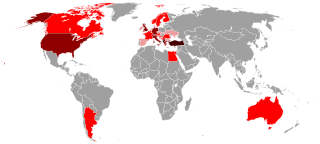
The Albanians are an ethnic group native to the Balkan Peninsula and are identified by a common Albanian ancestry, culture, history and language. They primarily live in Albania, Kosovo, North Macedonia, Montenegro, Serbia as well as in Croatia, Greece, Italy and Turkey. They also constitute a large diaspora with several communities established across Europe, the Americas and Oceania. Diaspora based Albanians may self identify as Albanian, use hybrid identification or identify with their nationality, often creating an obstacle in establishing a total figure of the population.

Enver Halil Hoxha was an Albanian communist politician. He was First Secretary of the Party of Labour of Albania from 1941 until his death in 1985. He was also a member of the Politburo of the Party of Labour of Albania, chairman of the Democratic Front of Albania, and commander-in-chief of the armed forces from 1944 until his death. He was the 22nd Prime Minister of Albania from 1944 to 1954 and at various times was both foreign minister and defence minister of the People's Socialist Republic of Albania.
The history of Albania forms a part of the history of Europe. During classical antiquity, Albania was home to several Illyrian tribes such as the Ardiaei, Albanoi, Amantini, Enchele, Taulantii and many others, but also Thracian and Greek tribes, as well as several Greek colonies established on the Illyrian coast. In the 3rd century BC, the area was annexed by Rome and became part of the Roman provinces of Dalmatia, Macedonia and Moesia Superior. Afterwards, the territory remained under Roman and Byzantine control until the Slavic migrations of the 7th century. It was integrated into the Bulgarian Empire in the 9th century.
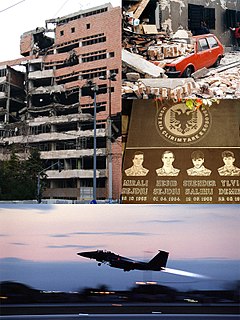
The Kosovo War was an armed conflict in Kosovo that started 28 February 1998 and lasted until 11 June 1999. It was fought by the forces of the Federal Republic of Yugoslavia, which controlled Kosovo before the war, and the Kosovo Albanian rebel group known as the Kosovo Liberation Army (KLA). The conflict ended when the North Atlantic Treaty Organization (NATO) intervened by beginning air strikes in March 1999 which resulted in Yugoslav forces withdrawing from Kosovo.

Kosovo, officially the Republic of Kosovo, is a partially recognised state in Southeast Europe. It lies at the centre of the Balkans, occupying an area of 10,887 km2 (4,203 sq mi), with a population of c. 1.8 million; and is bordered by the uncontested part of the territory of Serbia to the north and east, North Macedonia to the southeast, Albania to the southwest, and Montenegro to the west. Kosovo unilaterally declared its independence from Serbia on 17 February 2008, and has since gained diplomatic recognition as a sovereign state by 97 member states of the United Nations. Most of central Kosovo is dominated by the vast plains and fields of Metohija and Kosovo. The Accursed Mountains and Šar Mountains rise in the southwest and southeast, respectively. Its capital and largest city is Pristina.

Tirana is the capital and largest city of Albania. It is located in the centre of the country, enclosed by mountains and hills with Dajti rising to the east and a slight valley to the northwest overlooking the Adriatic Sea in the distance. Due to its location at the Plain of Tirana and the close proximity to the Mediterranean Sea, the city is particularly influenced by a Mediterranean seasonal climate. It is among the wettest and sunniest cities in Europe, with 2,544 hours of sun per year.
The origin of the Albanians has been the subject of historical, linguistic, archaeological and genetic studies. Albanians continuously first appear in the historical record in Byzantine sources of the 11th century. At this point, they were already fully Christianized. Albanian forms a separate branch of Indo-European, first attested in the 15th century, having evolved from one of the Paleo-Balkan languages of antiquity. The surviving pre-Christian Albanian culture shows that Albanian mythology and folklore are of Paleo-Balkanic origin and that almost all of their elements are pagan.

The Albania national football team represents Albania in men's international football, and is governed by the Albanian Football Association, the governing body for football in Albania.

The Parliament of Albania or Kuvendi is the unicameral representative body of the citizens of the Republic of Albania; it is Albania's legislature. The Parliament is composed of not less than 140 members elected to a four-year term on the basis of direct, universal, periodic and equal suffrage by secret ballot. The Parliament is presided over by the Speaker, who is assisted by at least one deputy speaker. The electoral system is based on party-list proportional representation. There are 12 multi-seat constituencies, corresponding to the country's administrative divisions.

The Kategoria Superiore, officially known as Abissnet Superiore for sponsorship reasons, is a professional league for men's association football clubs. At the top of the Albanian football league system, it is the country's primary football competition. It is contested by 10 clubs, and operates on a system of promotion and relegation with the Kategoria e Parë. Seasons run from August to May, with teams playing 36 matches each.
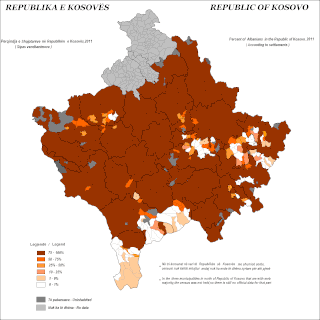
The Albanians of Kosovo (Albanian: Shqiptarët e Kosovës, pronounced [ʃcipˈtaɾət ɛ kɔˈsɔvəs], also commonly called Kosovo Albanians, Kosovar Albanians or Kosovars, constitute the largest ethnic group in Kosovo.
The Kosovo national football team represents Kosovo in international men's football. It is controlled by the Football Federation of Kosovo, the governing body for football in Kosovo.

Albanian folk beliefs comprise the beliefs expressed in the customs, rituals, myths, legends and tales of the Albanian people. The elements of Albanian mythology are of Paleo-Balkanic origin and almost all of them are pagan. Albanian folklore evolved over the centuries in a relatively isolated tribal culture and society. Albanian folk tales and legends have been orally transmitted down the generations and are still very much alive in the mountainous regions of Albania, Kosovo, southern Montenegro and western North Macedonia, among the Arbëreshë in Italy and the Arvanites in Greece.
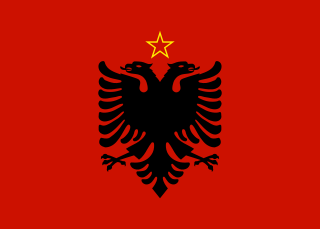
The People's Socialist Republic of Albania was the Marxist-Leninist one party state that existed in Albania from 1976 to 1992. From 1944 to 1946, the state of Albania was known as the Democratic Government of Albania and from 1946 to 1976 it was known as the People's Republic of Albania.

The Italian protectorate of Albania, also known as the Kingdom of Albania or Greater Albania, existed as a protectorate of the Kingdom of Italy. It was practically a union between Italy and Albania, officially led by Italy's King Victor Emmanuel III and its government: Albania was led by Italian governors, after being militarily occupied by Italy, from 1939 until 1943. During this time, Albania ceased to exist as an independent country and became an autonomous part of the Italian Empire. Officials intended to make Albania part of a Greater Italy by assimilating Albanians as Italians and colonizing Albania with Italian settlers from the Italian Peninsula to transform it gradually into an Italian land.

The German occupation of Albania occurred between 1943 and 1944 during World War II. Before the armistice between Italy and the Allied armed forces on 8 September 1943, Albania had been in a de jure personal union with and was de facto under the control of the Kingdom of Italy. After the armistice and the Italian exit from the Axis, German military forces entered Albania and it came under German occupation, creating the client-state, the Albanian Kingdom.
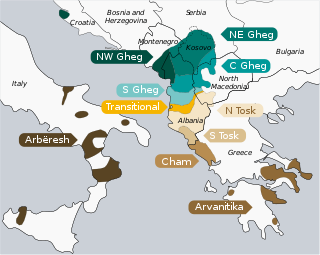
Albanian is an Indo-European language spoken by the Albanians in the Balkans and the Albanian diaspora in the Americas, Europe and Oceania. With about 7.5 million speakers, it comprises an independent branch within the Indo-European languages and is not closely related to any other Indo-European language.

The COVID-19 pandemic in Albania is part of the worldwide pandemic of coronavirus disease 2019 caused by severe acute respiratory syndrome coronavirus 2. The first case in the Republic of Albania was reported in Tirana on 8 March 2020, when a patient and his adult son who had come from Florence, Italy tested positive. Both men later recovered.

The COVID-19 pandemic in Kosovo is part of the worldwide pandemic of coronavirus disease 2019 caused by severe acute respiratory syndrome coronavirus 2. The virus was to be confirmed on the 13 March 2020 when an Italian women in her 20s work in the Caritas Kosova at Klina.